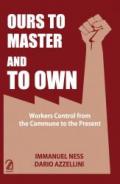Empresas recuperadas
Factory Takeovers in the European Mediterranean Area: Self-Managed Companies in France, Italy and Greece

Azzellini, Dario. 2024. “Factory Takeovers in the European Mediterranean Area: Self-Managed Companies in France, Italy and Greece.” CESCONTEXTO. 36: 38-46.
Entre la crisis climática, ecológica y social
¿Hay caminos para la Resistencia y las utopías?
Dario Azzellini: Discurso de inauguración del 15. Colóquio Nacional e 8. Colóquio Internacional do Museu Pedagógico da UESB. Vitoria da Conquista, Bahía, Brasil.
Aktuelle Analyse zu rückeroberten Betrieben. Gespräch mit Dario Azzellini
„Sie sind nicht nur Arbeitskräfte“

AT: Du dokumentierst in deiner Arbeit rückeroberte Betriebe in Europa und Lateinamerika. Ist das so bewusst geographisch gewählt, oder gibt es in den anderen Teilen der Welt weniger Beispiele?
Arbeiterinnen und Arbeiter erobern ihre Betriebe zurück und öffnen Wege zu einer nichtkapitalistischen Produktion
Solidarische Alternativen zu kapitalistischen Pleiten
"Laut Insolvenzstatistik des Statistischen Bundesamts wurden im vergangenen Jahr 2023 in Deutschland rund 176000 Unternehmen geschlossen. Davon haben 11 Prozent Insolvenz angemeldet. Immer wieder wird berichtet, dass Firmen trotz voller Auftragsbücher Insolvenz anmelden. Entweder stimmt die Gewinnmarge nicht, oder das Geld soll woanders lukrativer angelegt werden.
Vortrag und Diskussion mit Dario Azzellini
Arbeiter*innen als Boss. Des Glückes eigener Schmied!
Was tun, wenn der Betrieb schließt? Es folgt Arbeitslosigkeit, v.a. für ältere Mitarbeiter*innen kann sie bis zur Rente dauern. Manchmal können die Beschäftigten eine Abfindung erstreiten, doch wie lange reicht diese?
Workers Control From the Commune to the Present
Ours To Master and To Own
From the dawning of the industrial epoch, wage earners have organized themselves into unions, fought bitter strikes, and gone so far as to challenge the very premises of the sytem by creating institutions of democratic self-management aimed at controlling production without bosses. With specific examples drawn from every corner of the globe and every period of modern history, this pathbreaking volume comprehensively traces this often underappreciated historical tradition.
Recent years have seen a proliferation of recuperated workplaces around the globe, laying the foundations for a truly democratic workers’ economy.
Workers’ Control in the Crisis of Capitalism

In February 2016, a dozen former workers of a small woodworks plant in the small Greek town of Patrida, some 60 kilometers from Thessaloniki, had had enough. Since 2008 they had been tricked by the owners. With a promise to pay back everything soon, the bosses did not pay the workers their full salary anymore, reduced working hours and announced bankruptcy without making it official. But the situation never improved and the workers never saw their money. Finally, in December 2015, the plant closed.
Ocupar, resistir, producir - Vio.Me.
Vio.Me. en Tesalónica fabricaba pegamento industrial, aislamientos y otros materiales de construcción químicos. En 2010 los trabajadores y trabajadoras fueron enviados cada 4 ó 6 semanas de vacaciones sin cobrar sueldo. Cuando en julio de 2011 el propietario dejó de pagar los salarios totalmente, los trabajadores decidieron ocupar la planta y hacerse cargo de su propio futuro. En febrero de 2013 Vio.Me.
Occupy, Resist, Produce – Vio.Me.
Vio.Me. in Thessaloniki used to produce industrial glue, insulant and various other chemically derived building materials. In 2010 the workers agreed to be sent on unpaid leave every 4-6 weeks. Then the owners started reducing the workers’ wages, assuring them that it was only a temporary measure and they would soon be paid what they were owed. The owners’ main argument was that profits had fallen by 15 to 20 per cent. When the owners broke their promise to pay the back wages, the workers went on strike demanding to be paid.

























